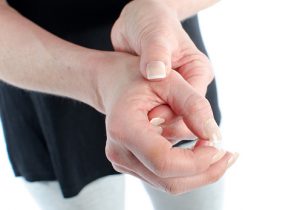
Although most commonly found in hand, feet, legs and arms, edema can occur anywhere in the body. If you’re concerned about swelling, here is all you need to know about edema.
Causes and symptoms of edema
Excess fluid can build up due to medications, pregnancy or even heart disease. Edema can be mild or severe and additional causes can result from:
- Sitting or remaining in one position for an extended period of time
- Consuming too much sodium
- Premenstrual sign
- Medications for hypertension
- Nonsteroidal anti-inflammatory drugs (NSAIDs)
- Steroid drugs
- Estrogen
- Certain medications for diabetes
Although edema can be caused by other factors and exist on its own, it can also be a symptom to more severe illnesses including:
- Congestive heart failure
- Cirrhosis – liver disease
- Kidney disease
- Kidney damage
- Weakness or damage to veins in the leg
- Poor lymphatic system
To recognize edema, here are the symptoms:
- Swelling of tissue beneath the skin
- Stretched or shiny skin
- Skin which retains a dimple when pressed
- Increased size of the abdomen
If symptoms like chest pain, shortness of breath or difficulty breathing occur it is advised you seek out medical attention.
Risk factors of edema
If you are on hypertension medications, certain diabetes medications, regularly take NSAIDs, use steroid drugs or estrogen, you increase your risk of developing edema.
Additionally, if you already have heart failure, kidney damage or liver disease, your risk of developing edema also increases.
Prevention tips and home remedies for edema
If edema is mild, treatment is not necessary, as it will go away on its own. If edema is severe the use of diuretics to expel the excess fluid may be necessary.
There are many lifestyle changes you can make and practice at home to help lower your risk of edema and even prevent it. They are:
- Reduce salt intake
- Change medications if it is the cause of edema – only under doctor supervision
- Move – moving the affected area will pump out excess fluid
- Elevation – keeping the area elevated will move the excess fluid
- Massage – massaging the swollen area can help move around excess fluid
- Compression – compression garments help expel excess fluid from a given area
- ensure affected area is consistently clean and moisturized
These are easy home remedy tips to practice when treating edema on your own.